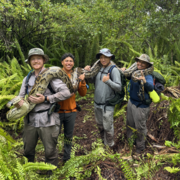Telemetry
Telemetry
Filter Total Items: 9
Invasive Burmese python research in the Greater Everglades
USGS leads federal research to control the highly invasive Burmese python ( Python bivittatus), which has become firmly established across the Greater Everglades Ecosystem and poses a serious threat to native wildlife. Capable of reaching over 17 feet long, this massive constrictor is believed to be a key factor in the sharp decline of mammal populations in the region. For over a decade...
Ecology of the Diamondback Terrapin: Demographics, Movements, and Habitat Use
In response to declining populations, researchers at WARC are collecting data on demographics, movement patterns and habitat use, ecological niche and foraging ecology, and nesting ecology of diamondback terrapins.
Distribution and Density of Sea Turtles in the Gulf: Gulf of America Marine Assessment Program for Protected Species (GoAMAPPS)
The over-arching goal of GoAMAPPS is to collect broad-scale survey data for seabirds, marine mammals and sea turtles to determine distribution and abundance in the Gulf.
Gulf Sturgeon Ecological Investigations
The Gulf sturgeon, Acipenser oxyrinchus desotoi, has been listed as Threatened since 1991. Beginning in 1986, USGS has been investigating sturgeon population abundance and ecology throughout its range, but mostly in the Suwannee River.
Sea Turtle Movement and Habitat Use in the Northern Gulf
The Bureau of Ocean Energy Management (BOEM) uses trawling to capture and relocate live sea turtles away from dredging locations to minimize the risk of turtle entrainment. These incidental turtle captures provide a unique opportunity to fill critical data gaps for difficult to capture life-stages of marine turtles.
Seagrass Beds and Manatee Foraging Areas in the Ten Thousand Islands: Mapping and Characterizing by Incorporating Manatee GPS Tracking Data and Habitat Information
Turbid water conditions make the delineation and characterization of benthic habitats difficult by traditional in situ and remote sensing methods. Consequently, only a small fraction of this valuable resource has been mapped or characterized.
Health Effects and Behavioral Response of Florida Manatees (Trichechus manatus latirostris) to Persistent Algal Bloom and Associated Loss of Seagrass Resources in Brevard County, Florida
USGS researchers are working with partners to assess the health and foraging behavior of Florida manatees in the northern Indian River Lagoon and Banana River, areas that have experienced declining seagrasses due to an extended phytoplankton bloom.
Preserving Gulf Sturgeon—A Fish Tale of Gargantuan Proportions
It's hard to imagine a better job than doing fieldwork with the USGS Coastal Ecology crew as they work to keep tabs on the Gulf sturgeon population.
Winter Manatee Foraging Behavior and the Decline of Seagrass Beds in the Northern Indian River Lagoon
With high numbers of manatees using the Florida Power and Light power plant warm water refuge during winter, their impact on the seagrass beds in the Indian River Lagoon is considered an important indicator of the long-term capacity of the area to support the manatees. USGS is working with partners to investigate the spatial extent and intensity of manatee use of seagrass beds in the area.









